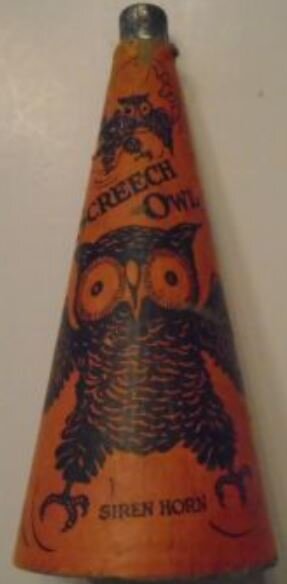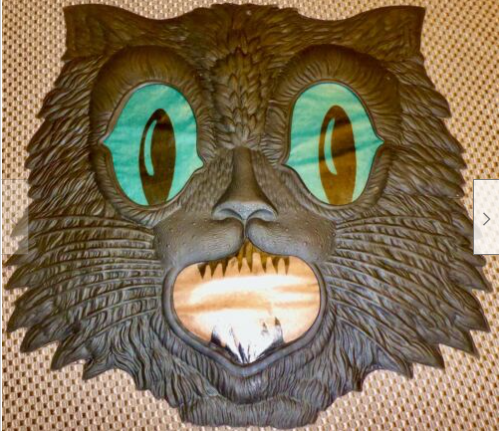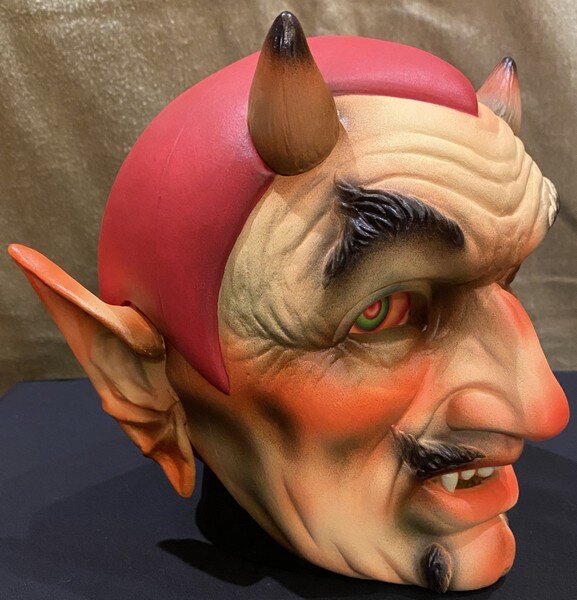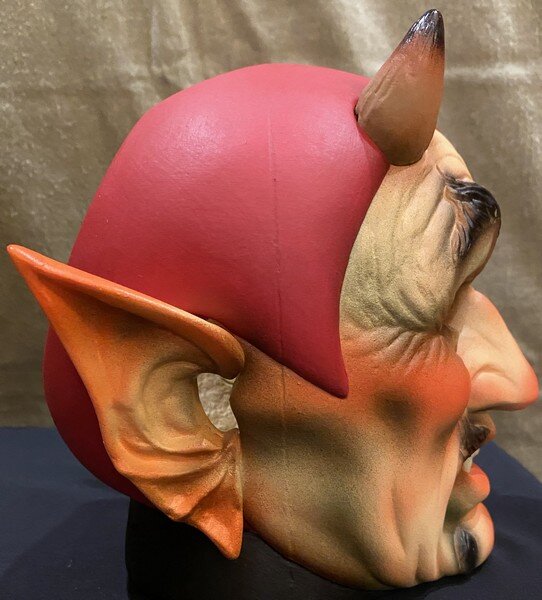Blog
Antique Gibson Halloween Gummed Seal Black Cats in NM box 1930 RARE
Vintage Mechanical Halloween Bridge Tally Score Card Small Slam 50 pts Grand 100
LARGE VINTAGE HALLOWEEN WITCH ON BROOM BLACK CAT DIE CUT USA
This great seller often has wonderful items up for auction. This very hard-to-find diecut of a grimly determined broomed witch is one of a set of three large witch diecuts Beistle issued in the late 1950s. In my view, the set represents the last gasp of Beistle’s creativity for many years. These diecuts are often found in poor condition given their size and the thin paper stock Beistle used.
RARE Vintage Japan Halloween Porcelain Jack o Lantern JOL Covered Trinket Box
The vintage Halloween market is certainly not a static one. Market segments fall in and out of favor. Candles used to be as cold as the Arctic, now they are warm. Small paper used to be an affordable niche. There is little affordable about that segment now. These Japanese porcelain items used to be so cold you could more profitably use them for skeet practice. Now look at what even examples in less-than-perfect condition bring. Collect what you love and hope those segments increase in value, but don’t count on it.
Vintage Halloween Cardboard Candy Container Nut Cup Cat Owl Skeleton By Dennison
Here’s something that doesn’t pop up often. This highly stylized combination nut cup and place card was issued by Dennison in 1929. There were four designs to the complete set - and the four designs were only sold as a set. The stock number was H466. As I write on page 260, “The fantastical imagery of these items is consistent with Dennison’s design focus during the narrow window of 1929-1931.”
Vintage Antique HALLOWEEN Party Invitation
Here’s yet another example of a seller putting something up for sale they know little about. This rare Dennison invitation first appeared in their 1922 Bogie Book. It has been years since the last one of these was offered. Given today’s nonsensical prices for many examples of small paper, this seller left a lot of money on the table. This was grabbed up in an instant for a laughable $6 with free shipping. If this seller had been smart and let it run as an auction it would have fetched perhaps 40 times that amount and maybe more. (Shaking my head as I type…)
Vintage 1930's Halloween Screech Owl Siren Horn Hampton Co. Easthampton, Mass.
Vintage Halloween Die-Cut, Embossed Decorations & Paper Masks from 1920s
Vintage German Halloween Poster Featuring a Black Cat
This exceptional item looks to be in unbelievably nice condition. I’ve only seen this variant with factory inserts once - and I bought it. It now appears on page 172. The Germans seemed to produce these variants with inserts only occasionally. (Other examples appear on pages 171, 177 and 181.) If you like rare German diecuts, don’t let this one slip away.
10/13 Update: This brought an unbelievable $2,225!
Rare ANTIQUE DENNISON DIECUT HALLOWEEN FLYING PURPLE OWL DECORATION c.1930's
New Lantern Design from Tim Ramzyk of Pulp Novelties!!
Tim Ramzyk is just days away from releasing his latest fantastic creation, The Devil! Just look at the craftsmanship! Having the privilege of owning six of his prior designs, it can be no secret that Tim is one of those artists that just gets better with each new item. When I unboxed this treasure today, I involuntarily exclaimed, “Wow!” It measures 7.25” high by 7.75” across by 7.5” deep. Just look at those ears! They remind me of the tailfins on the 1959 Cadillac Eldorado!
Tim is a Wisconsin-based artist who meticulously and painstakingly hand molds his own designs from a heavy, durable material. I am in awe at the workmanship and the true craft Tim brings to pulp design. I proudly have all of his treasures now on exhibit in my main display room. (For those who I've been lucky to host at my home, you know that in order for anything to be placed in that room, it has to be pretty spectacular.)
Tim is offering The Devil for $160 plus shipping, a bargain for an item of this quality! He’ll begin selling them in small batches on Etsy on October 1st. Due to past levels of demand, he may create request lists when the initial batch sells through. Make sure you get your name on that list as early as you can! The name of his Etsy shop is PulpNovelties. You can also contact him directly at pulpnovelties@aol.com.
For those who know me, you know that I rarely buy anything Halloween unless it is vintage. I've made an exception - and you should too. Snap this wonderful design up before they are ALL GONE.
AMAZING 1926 Halloween Pan Confection Co. Store Display 20 Pcs.
This listing was arguably one of the most important ones to see the light of day this year for us paper lovers. Over the many decades I’ve avidly collected vintage Halloween, I’ve seen the odd piece from what I know now is this set issued in 1926. I often wondered what they were and which firm made them. The devil with pitchfork and the owl atop rocks were the two I had seen on a handful of occasions. In fact, I had sold the former in this year’s May auction - inaccurately dating it to the 1930s. I saw this listing almost immediately. The seller had chosen a main photo that surely deterred many collectors from clicking on the listing. The seller listed it at $9.99 with an option to make an offer. I made an offer of $1900, but it was auto-declined when someone placed the minimum bid. I contacted the seller and made a private offer. He consulted with the consignor who decided to let the auction run its course, typically the smart decision. If you examine the original listing you’ll see the set is complete with the hanging witch, the illustration shown below and the original mailing envelope. This set was sent free to candy shops that ordered Pan’s 1926 Halloween case assortment. I think I am on safe ground to say that not many complete sets made it through nearly 100 years in this near-pristine condition. The pieces are quite large. The devil backdrop measures 26” across by 17”. I was the prevailing bidder at the bargain price of $832.99. My maximum bid was far higher. Considering that an incomplete box of Dennison seals sold for $900, this was a true bargain, made more true as this is a possibly one-of-a-kind set. It is now a jewel in my personal collection - one of the best acquisitions I have ever made.
Vintage Halloween 1900's Aleinmueller Paper Hat Black Cat,Witch Fab Graphic 14"H
This may be the first time I’ve seen one of these hats actually complete. The paper used was so thin that much of a hat was gone or severely ripped when I’ve seen one on offer. The fact that it has been on a conical mold for a while preserving its intended shape is a bonus. The price paid seems a relative bargain considering what many common items have been recently bringing. Congrats to the buyer!
1920's HALLOWEEN PARTY INVITATION / WHITNEY / BOY w/ JACK O LANTERN GHOSTS MOON
I love when examples surface with a firm date affixed. The (probably) Whitney invitation is shown on page 277 with a date attribution of the 1920s. While that is technically correct, we know now that this invitation was produced as early as 1920. (That’s assuming the person writing the note on the invitation wasn’t date-addled!)
09/30 Update: This brought an astounding $228.37.




















